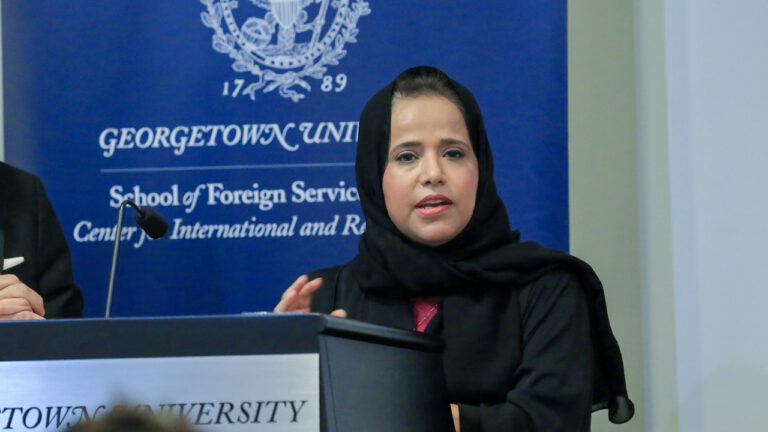Dialogue Series, Race & Society, Regional Studies
Strengthening the Family in Qatar: Challenges and Required Actions

Noor Al Malki Al Jehani, Executive Director of the Doha International Family Institute, delivered the final CIRS Monthly Dialogue of the 2014-2015 academic year with a lecture on “Strengthening the Family in Qatar: Challenges and Required Actions” on May 25, 2015. Al Malki gave an overview of the historical evolution of family policies in Qatar, resulting in “the family cohesion agenda,” in the Qatar Vision 2030 and the National Development Strategy of 2011-2016. As an introductory note, she stated that “while I think that Qatari families should be the primary targets of policymaking in Qatar, these policies should also take in consideration the wellbeing of all families in Qatar,” including expatriates who make up a majority of the population.
Al Malki pointed out that although people tend to view the notion of family through their own personal sets of beliefs and experience, the family structure continues to be the defining basic unit of most societies. This is “because healthy, functioning families play an essential role in individual, human, social, and economic development,” and the dissolution of this structure places a heavy burden on governments, she said.
Historically, the Qatari family structure has evolved differently to that of the predominant Western nuclear family. The formation of the Qatari family is governed by Islamic principles, and incorporates responsibility towards members of the extended family, including inheritance rights. The historical structuring of the Qatari family is also based on tribal affiliations, which is an organizing societal force that predates that of the state in the Gulf region and continues to this day. “The tribe might have lost some of its authority over its member families, and its economic role, but it is still a major force in family life, and is supported by the continuing practice of intermarriage and a unique system of tribe and family-based neighborhoods,” Al Malki explained.
The family as the basic unit of society became enshrined in the Qatar constitution with the establishment of the State of Qatar in the second half of the twentieth century. Various state laws have been built around the family as a social institution in order to further support and regulate it. The first official family policies were introduced in the 1960s, and revolved around the implementation of social security laws to provide monetary and housing assistance to the most vulnerable in society, including low-income families, widows, divorcees, and orphans.
In the 1980s, as the Qatari state developed and grew more prosperous, “Qatari men were growing richer, and they started to explore the Middle East and other countries,” leading to increased marriages between Qatari men and non-Qatari women, Al Malki explained. It was during this time that the government took a step to directly intervene by introducing a law to regulate marriage to non-nationals, with the exception of GCC citizens, as a response to “growing problems related to nationality claims,” she said.
In the 1990s, Her Highness Sheikha Moza Bint Nasser played a major role in the social development of Qatar as President of the Supreme Council for Family Affairs and the founder of a number of private organizations including the Family Development Center, the Family Consultation Center, and the Foundation for the Protection of Children and Women. All the organizations were tasked with a mission of community development by focusing on strengthening the wellbeing of the family, and promoting the rights of women and children in Qatar. Importantly, Al Malki said, Sheikha Moza’s influence was not limited to Qatar, and she established the Doha International Family Institute (DIFI), with a mandate to promote the family at the national, regional, and international levels to research policy and outreach.”
In order to achieve family cohesiveness in the Qatar Vision 2030, “the strategy seeks to address some of the trends affecting Qatari families, such as the rising divorce rates, high proportions of women who marry late or remain single for life, the growing levels of family violence, the dependence on domestic helpers and caring for children, family-work conflict, and the alarming rate of personal debt among Qatari families.” Al Malki noted that the strategy focuses on familial dysfunction, and fails to adopt a more comprehensive approach to strengthening the family. This is because of the lack of civil society organizations and national expertise and capacity geared towards these issues. “Family strategies are multi-sectorial in nature; they cannot be implemented by one ministry alone,” she argued. “The lack of community-based and non-governmental organizations is a major challenge.”
Al Malki concluded by making some recommendations for the future, including an increase in government and private sector funding for civil society organizations, as well as an ease of the strict laws governing the establishment of such entities. As a first step, she recommended establishing degrees in family studies to be given at educational institutions in order to build national expertise. “Achieving Qatar’s Vision of cohesive families requires a partnership between the government, civil society, the private sector, and, first and foremost, families themselves,” she concluded.
Noor Al Malki Al Jehani served as the Secretary General of the Supreme Council for Family Affairs from 2009-2011, and prior to that was the director of the Women’s Department of that same council. She is currently a member of the Board of Directors for Qatar Foundation for Social Work, and was a member of the Qatar National Human Rights Committee from 2003 until 2011. Al Malki was an expert in the United Nations Committee on the Elimination of Discrimination against women from 2013-14. She participated in the drafting of many national strategies and plans, including Qatar’s first national development strategy 2011-16, where she was the chair of the drafting committee of the strategy of family cohesion and women’s empowerment. She also participated in the review and drafting of several legislations pertaining to social and women’s issues.
Article by Suzi Mirgani, Manager and Editor for CIRS Publications.